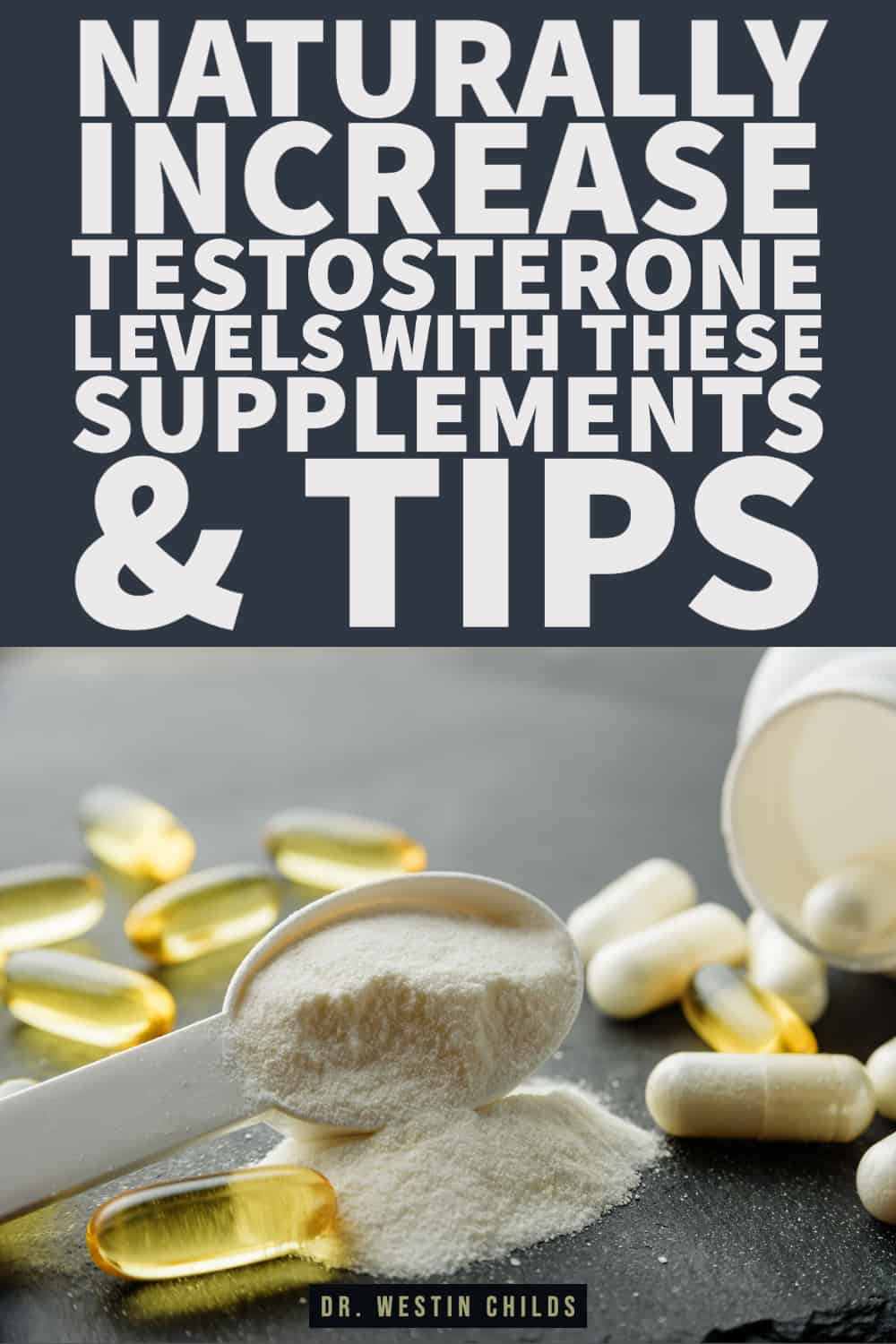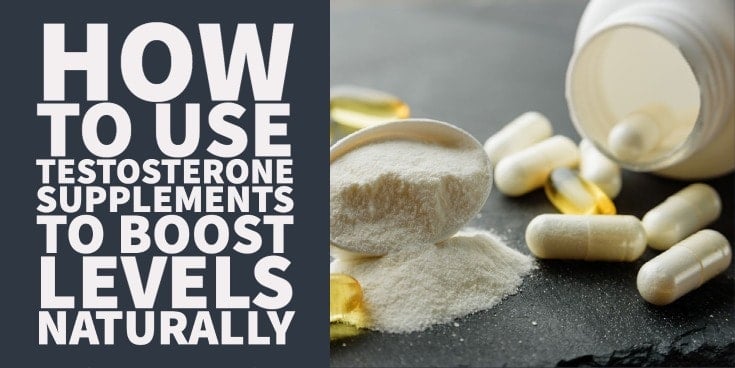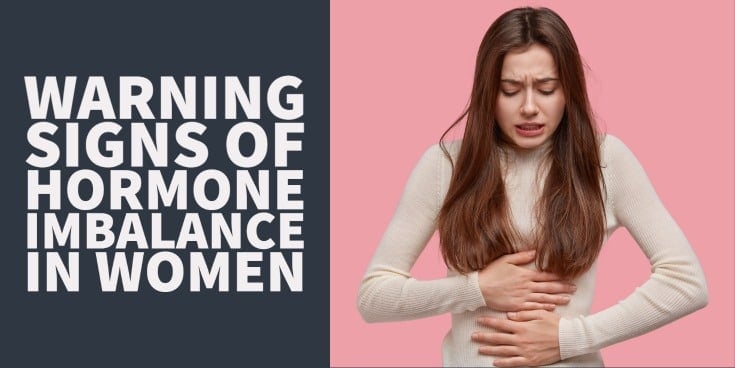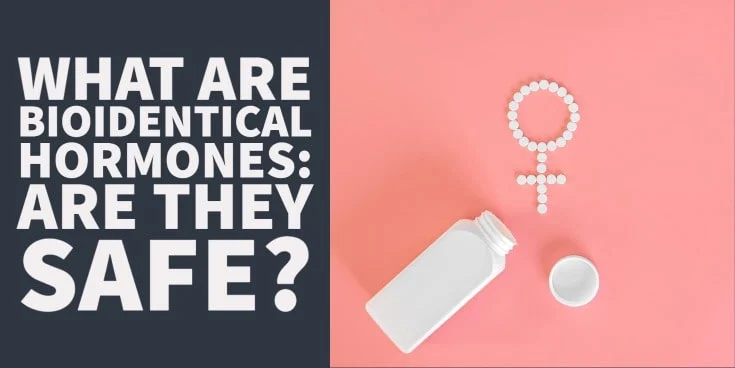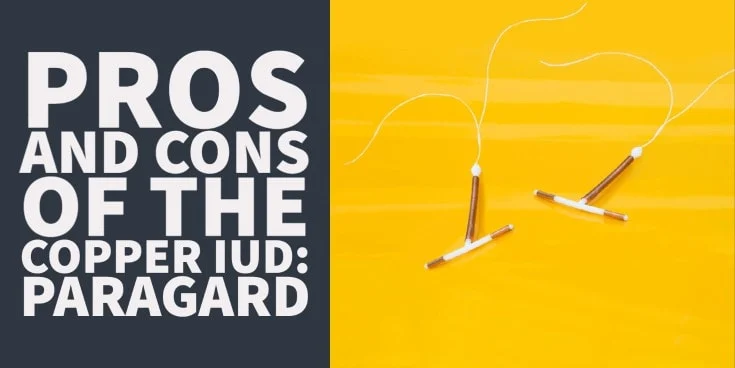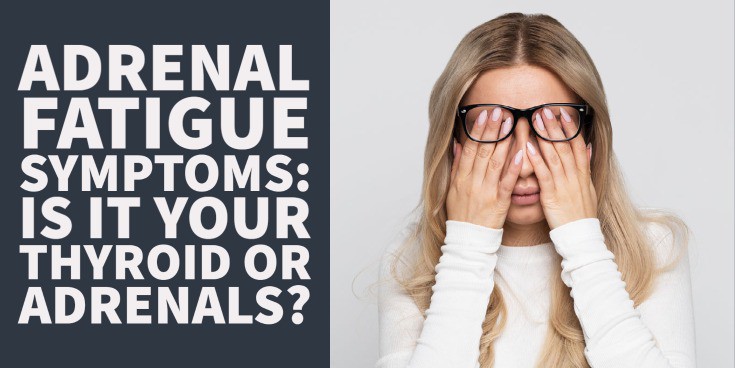Testosterone is critical to the maintenance of health and overall quality of life for both men and women.
Because of its role in regulating muscle mass, weight and mood it is no wonder that supplements designed to increase testosterone have emerged on the market.
But the question remains:
Is it all hype or is it legitimate?
Some testosterone supplements do work to increase testosterone, but in order to get this benefit you need to use the right ones.
Learn more about the science behind low testosterone and take a more scientific approach to supplementation in this guide:
Do Testosterone “Boosters” Really Work?
With the accelerated decline in testosterone among men there is a huge market for supplements that target testosterone.
And it’s for good reason:
As a man, there are a number of reasons you would want to increase testosterone ranging from an increase in muscle mass, weight loss, improved libido, improved sleep, reduction in cardiovascular mortality, and more.
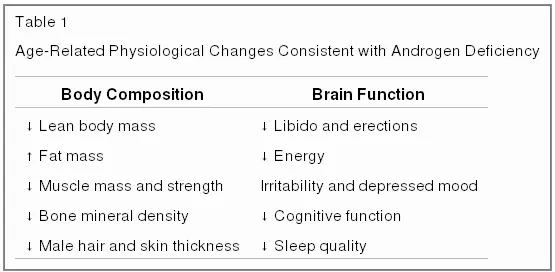
But does that mean you should jump on the bandwagon and try out these testosterone boosters?
The answer is maybe, but it really depends on your situation and your goals.
To better understand we need to take a deep dive into the science of testosterone boosters and really compare them to testosterone replacement therapy as the gold standard.
Before you use them you should have a realistic understanding of how much of an increase in testosterone you should expect.
Most over-the-counter testosterone “boosters” may increase testosterone (if you use the right ones) by 20-50% from baseline.
This should be compared to testosterone replacement therapy which can increase testosterone levels many times that (300-400%).
So while they do tend to increase testosterone (technically) the increase doesn’t necessarily meet the expectations of those who use them.
But there are ways to improve this increase in testosterone and that’s by targeting the supplements that you use for YOUR body.
You can do this by understanding what causes low testosterone and understanding the mechanism of action of certain supplements.
What Causes Low Testosterone
Instead of blindly taking testosterone “boosters” there is a better approach.
One that focuses on finding conditions that may prematurely lower your testosterone and treating or reversing those things.
This approach will allow your body to naturally produce testosterone at the level it is capable of producing it.
It’s worth pointing out, however, that ALL men will naturally start to produce less testosterone over time.
So the total amount of testosterone that a man can produce is based on both his age and his current health status.
Let’s say you produce around 900mg of testosterone naturally when you are a teenager (the “standard testosterone range” is somewhere between 200-900 for most labs).
We know that men lose about 1% of their total testosterone each year for every year after age 30 assuming they are otherwise in perfect health.
So by age 40, you can expect at least a 10% drop in total testosterone assuming you are not overweight, you are staying active, you take no medications, you are sleeping 8 hours per night and you are exercising at least once per week.

This is not the reality for most men and it shows in their testosterone lab work.
Most men would be somewhere around the 400-500 range by age 40 and this number continues to drop over time (I am now seeing young men under 30 with testosterone levels in the 200-300 range).
And this is why it’s so important to manage your testosterone levels as you get older and try to maintain them as much as possible.
So what other factors may prematurely cause a reduction in testosterone levels?
I’ve included a list below, and this list is very important because it gives us an idea of how to supplement (more on this below):
Factors that prematurely cause low testosterone or accelerate the decline in testosterone levels in men:
- Age (1% decline per year starting after 30)
- A reduction in Growth Hormone and IGF-1 (Growth hormone declines with age as well)
- Lack of physical activity
- Reduction in muscle mass
- Chronic stress
- Lack of sleep (less than 8 hours per night)
- Alcohol use
- Medications
- Chronic illness
- Poor diet
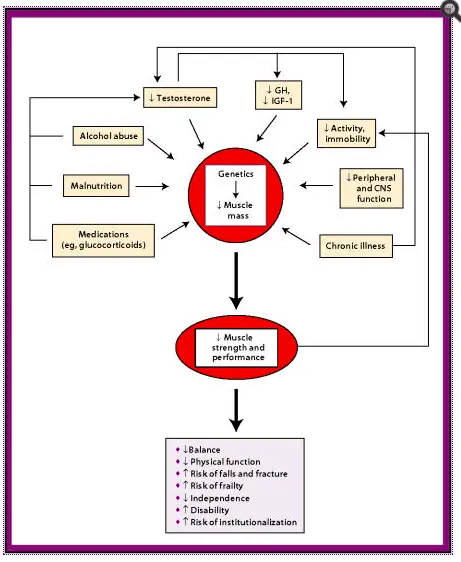
As testosterone levels decline (prematurely or not) you may begin to experience decreased libido, hair loss, mood changes (depression and/or anxiety), a reduction in bone mineral density, decreased energy levels, and an increased risk of cardiovascular disease.
With all of these symptoms at stake, it’s no wonder that many men turn to testosterone supplements and hormones.
While testosterone supplements can work they are not as reliable or as powerful as testosterone hormone replacement therapy.
Having said that it is still worth a discussion because not all men will want to undergo TRT or it may not be available to them.
“Direct” Testosterone Boosters
Direct testosterone boosters and supplements are marketed as such because they claim to increase testosterone directly simply by taking the supplement.
But there’s one big issue…
Many of these supplements have been tested in scientific studies and don’t always show that they do indeed increase testosterone.
Having said that, these studies almost always do show improvement in various quality of life issues such as libido, muscle gain, etc.
So why are the studies inconsistent?
Much of this probably has to do with the relative cause of low testosterone and how it varies from person to person.
If you gather 100 men and put them into 1 large group you can bet that the overall cause of suboptimal testosterone in each man probably differs slightly from one person to the next.
With a diverse sample size you can “wash out” the benefits and it may be difficult to reach “statistical significance” by study standards.
Does that mean you shouldn’t try them?
Not necessarily, and the reason is that they may actually work for YOU.
With that in mind let’s discuss the supplements that tend to get the most hype:
#1. D-Aspartic Acid
Aspartic acid is an alpha amino acid that exists in two isoforms: L-aspartic acid and D-aspartic acid.
D-Aspartic acid (abbreviated DAA) has been shown to stimulate the production and the release of testosterone through pathways in the HPG or hypothalamic-pituitary-gonadal axis.
DAA has also been shown to increase the expression of a steroid-inducing gene StAR which is a key regulator of cholesterol in mitochondria.
This regulation is important because it is felt to be the rate-limiting step in the production of testosterone.
If you can increase this step then theoretically you can increase the production of testosterone naturally.
And indeed some studies show that this may be true.
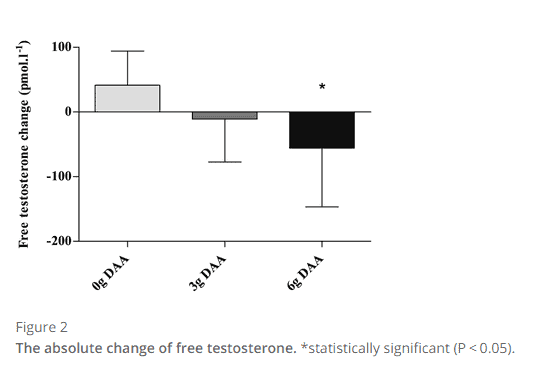
In one study researchers showed that taking 6 grams of DAA per day resulted in an increase in both free and total testosterone.
What’s more interesting is that this increase occurred with testosterone and not other hormones (estradiol, SHBG, and albumin).
In this study, DAA was taken each morning in doses of either 3 grams per day or 6 grams per day for 14 days straight.
There was a nonsignificant increase in testosterone in the group that took 3 grams per day compared to a significant increase in those who took 6 grams per day.
You can find more information on DAA and both animal and human studies in this systematic review.
If you decide to use DAA you will want to use at least 6 grams per day for 30 days. I recommend using a brand like this one.
#2. Maca (Lepidium meyenii)
Maca is a supplement that is marketed as a sex booster or libido enhancer but it doesn’t tend to have any measurable influence on serum testosterone.
Studies have shown that maca absolutely increases sexual desire (if taken daily for 2-4 weeks), but these same studies suggest that this increase in sexual drive is not related to testosterone levels.
While the exact mechanism is not well understood it is felt that maca works on mood which then indirectly influences libido.
It’s worth mentioning in this discussion because one of the main symptoms of low testosterone is decreased libido or erectile dysfunction.
If you are suffering from either then it may be worth looking into maca as a potential supplement.
Just realize that studies don’t show it actually increases serum testosterone.
For best results, I recommend using up to 2 tablespoons per day of organic Maca powder which you can easily add to a morning smoothie or dissolve in a drink.
#3. Fenugreek
Fenugreek is another supplement that may potentially increase free testosterone levels in certain individuals.
The exact mechanism for how it may influence testosterone is not well understood but this benefit may be mediated through its effects on insulin and because it may act as a 5-alpha-reductase inhibitor.
We will discuss the influence of insulin on testosterone levels below, so let’s focus on the enzymatic activity here.
5-alpha-reductase is the enzyme that converts testosterone into dihydrotestosterone.
Dihydrotestosterone (or DHT for short) is a much more androgenic steroid than testosterone is and high levels of DHT may contribute to male patterned baldness in some men.
The idea is if we can reduce the conversion of testosterone to DHT then DHT levels should fall and testosterone levels should increase.
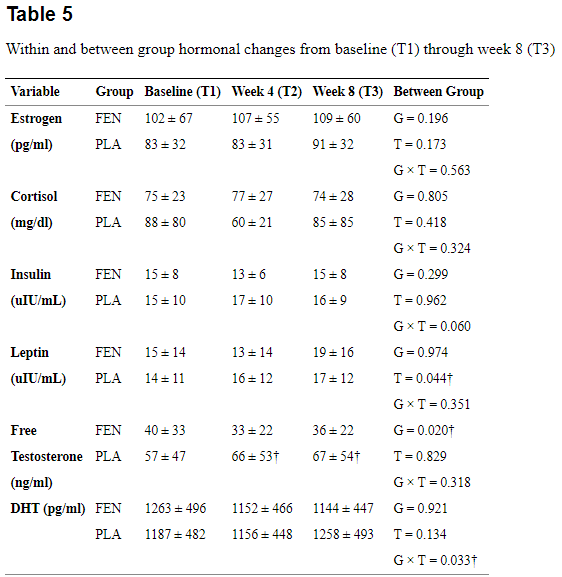
Studies show that this does tend to occur but not to a statistically significant degree.
It doesn’t mean that fenugreek should be avoided, but you should have a realistic understanding of what benefits may occur while using it.
Fenugreek can still be used, though, especially in men who are overweight and suffering from blood sugar or insulin-related issues.
Fenugreek should always be used in conjunction with resistance training as well for the most benefit.
If you use Fenugreek make sure to use up to 2 grams per day for best results.
#4. Tribulus terrestris
Tribulus may be the #1 selling supplement for “boosting testosterone” on the market and is included in almost every T supplement.
Tribulus terrestris is an herbal supplement and part of the Zygophyllaceae family.
It has been used in traditional and ancient medicine to help increase sexual desire and confidence.
While there is definitely some truth to the fact that it increases libido, studies showing that it increases testosterone are highly variable among humans.
Some human studies show that tribulus does not increase testosterone, while others show that it can increase testosterone in aging males with documented deficiency.
This lack of consistency between studies probably highlights the fact that each person is unique and the fact that there aren’t “standard doses” or an agreed-upon “length of treatment” for supplements (as compared to pharmaceutical medications).
It doesn’t necessarily mean you shouldn’t try the supplement because the studies are inconsistent but rather it means if you do try it you should watch your numbers closely to determine if it is actually working in your body.
The studies that show tribulus has a beneficial effect on testosterone tend to use dosages in the 750mg per day range in divided doses.
If you do decide to use tribulus I would recommend a supplement such as this.
Alternatively, you may also try one that is combined with other potential testosterone boosters.
“Indirect” Testosterone Boosting Supplements
Another, and perhaps better, route to take to increase testosterone is to focus on a more indirect method.
This method targets the conditions that are known to cause a premature drop in testosterone among males.
The good news about these conditions and supplements is that there are documented studies showing that these disease states do result in lower-than-normal testosterone and the treatments actually work.
This also represents a better approach to the management of your health overall.
It makes more sense to focus on abnormalities and disease states to help your body naturally produce the amount of testosterone that it can for your age.
#1. Supplements that Promote Weight Loss & Reduce Insulin Resistance
It is well established that obesity and weight gain lead to lower levels of testosterone in men.
When you consider that up to 73% of men in the US are considered to be overweight or obese, this weight problem may be the #1 cause of low testosterone among men.
In fact, this correlation is quite obvious, especially when looking at graphical figures:
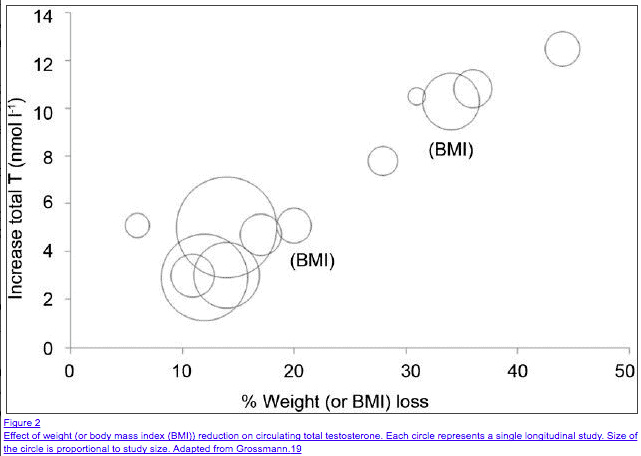
The graph illustrates that the more weight you are able to lose (% weight loss) the higher the rise in testosterone that is seen.
What is even more interesting is that the relationship between weight gain and low testosterone is bidirectional.
Low testosterone leads to weight gain, and weight gain leads to low testosterone.
More relevant to this discussion is that weight loss leads to an increase in testosterone and studies have also shown that increasing testosterone leads to weight loss.
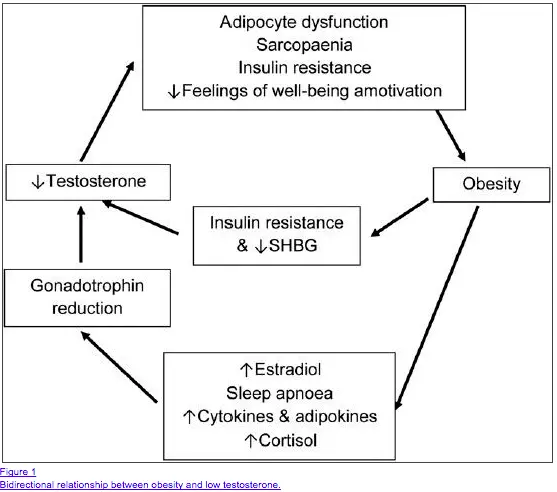
So what does this mean for you?
If you are overweight then managing your weight is probably the single easiest way to increase testosterone.
You can go about this problem in 2 separate ways:
First:
You can simply take testosterone replacement therapy which may lead to weight loss.
And/or second:
You can lose weight to naturally increase your testosterone level.
There are documented supplements that can help with weight loss and thus indirectly lead to an increase in testosterone.
You can find more information about these supplements below:
- MCT Oil – MCT oil stands for medium chain triglycerides and these healthy fatty acids are rapidly absorbed and readily utilized as a preferred energy source in the body. Supplementation with MCT oil can help burn fat, increase energy levels, manage appetite and improve mental focus.
- Berberine – Berberine is a plant alkaloid that directly helps sensitize the body to insulin and promotes weight loss directly. It’s also helpful in promoting muscle growth.
- CLA – CLA is another fat that is concentrated in dairy products but supplementing with very high doses has been shown to help promote muscle growth and directly reduce fat mass.
For best results, you should combine supplements with both proven dietary changes and exercise routines to help optimize weight loss.
#2. Supplements to Improve Sleep
Lack of sleep is another huge cause of low testosterone among men and is a relatively easy fix with certain supplementation.
Acute lack of sleep (as defined as only 5 hours of sleep per night for 7 days) was enough to drop the serum testosterone levels of young men by 10-15%.
To put this into perspective this can be compared to the 1% per year drop that most men experience after age 30.
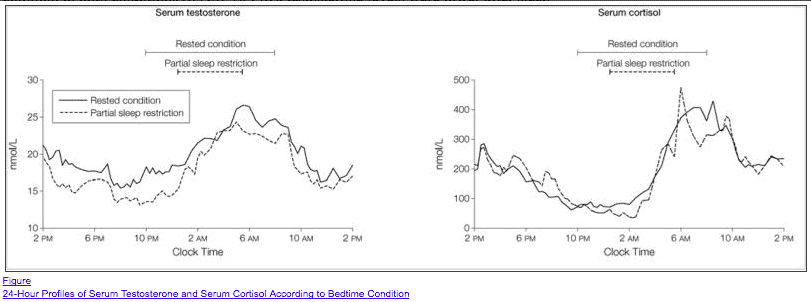
The good news is that improving the duration of sleep resulted in the normalization of testosterone levels (up to whatever level is normal for the person).
This makes targeting your sleep an important and easy step in increasing testosterone.
If you are targeting testosterone then your goal should be a minimum of 8 hours of quality sleep each and every night.
If you are sleeping less than 8 hours per night then these supplements may help increase both the quality and duration of your sleep:
- 5-HTP (100mg in the evening) – 5-HTP is a gentle supplement that may help increase the quality of sleep by activating both serotonergic and gabaergic pathways.
- Melatonin (1-3 mg in the evening) – Melatonin is a powerful sleep hormone that helps induce and maintain sleep throughout the night. Due to a variety of reasons (including blue light exposure) melatonin may be suppressed in many individuals. Supplementing with a low dose may help normalize levels and improve sleep. If you have never tried melatonin before then start with a low dose and only use as little as possible (preferably 1mg to start). I have tested my own personal melatonin levels and found them to be incredibly low, so you can test them if you want or you can supplement and determine if it helps.
You can also increase the quality of sleep by removing blue light from your computer screen (and phone screen), listening to delta-waving-inducing tunes at night, and by sleeping in a cold/dark room.
#3. Supplements to Enhance Muscle Growth
Another way to increase testosterone is to increase muscle mass.
It’s well known that certain powerful compound exercises such as squats and deadlifts help increase testosterone and the reason is felt to be through the increase in muscle mass.
It’s also well known that testosterone influences muscle mass production and maintains muscle mass over time and prevents a condition known as sarcopenia.
The idea is that you can retain testosterone if you retain muscle mass.
You can do this by simply taking testosterone to influence muscle mass, or you can take supplements and use strength training.
If you are lifting and doing strength training then it may be even more beneficial to consume a high-quality protein powder to help facilitate muscle mass and growth.
- Protein Powder – Protein powder helps provide your body with the basic building blocks required for muscle synthesis. Instead of whey protein, I recommend organic plant-based protein powder for easy assimilation and absorption.
Testosterone Supplements vs Testosterone (The hormone)
We’ve spent the majority of this article focusing solely on testosterone-enhancing supplements, but what about testosterone replacement therapy?
How effective is testosterone replacement therapy compared to taking testosterone-boosting supplements?
Taking testosterone the hormone will always increase testosterone more than taking any over-the-counter supplement and I don’t think anyone would argue this point.
Testosterone replacement therapy is a safe way to dramatically increase testosterone in a matter of days.
This should be compared to testosterone-boosting supplements which may take weeks to kick in.
There is still a place for taking these supplements, however, because not all men will want to use testosterone replacement therapy or have that option available to them.
TRT is also potentially expensive when you consider physician office visits, medication costs, and lab tests.
But it should be pointed out that your results will be superior and results will be more dramatic if you use testosterone hormone over testosterone supplements.
Final Thoughts
The bottom line?
Rather than taking “testosterone boosters” a better approach to managing testosterone may be to focus on those things that may be prematurely limiting your full potential.
By targeting and focusing on certain lifestyle factors including weight management, the quality of your sleep, and the maintenance of muscle mass you can help naturally maintain testosterone.
In addition, if you want to optimize your health it’s better to take a multi-faceted approach which includes weight training, proper diet, stress reduction, and supplementation.
Lastly, it’s important to realize that while supplementation can increase your testosterone, it will not lead to the massive increases that are often seen with testosterone hormone replacement therapy.
The choice between using supplementation or hormone management is up to you.
Now I want to hear from you:
Have you been able to increase your testosterone with supplementation?
If so, which supplements work best?
Leave your comments below! Your comments help others to know what works and what doesn’t.
